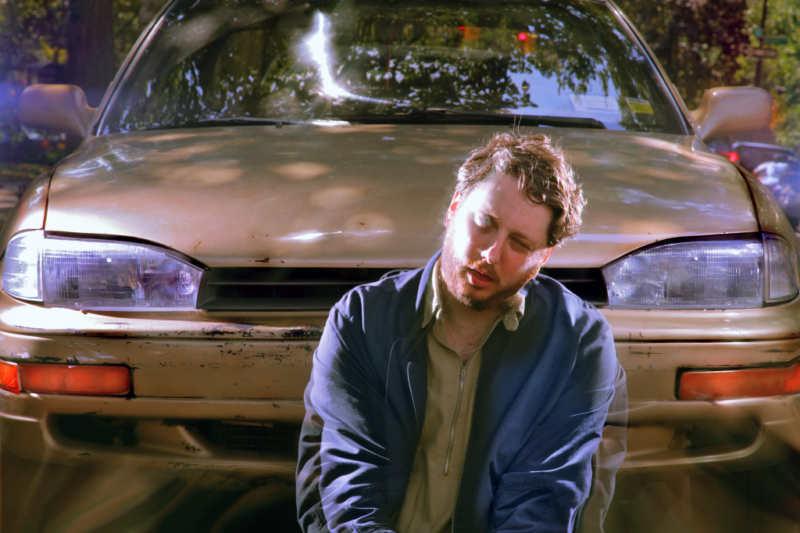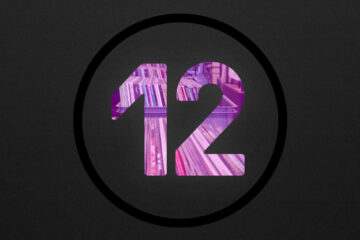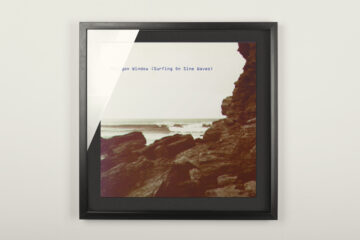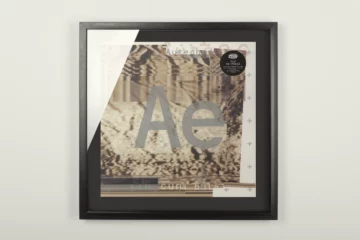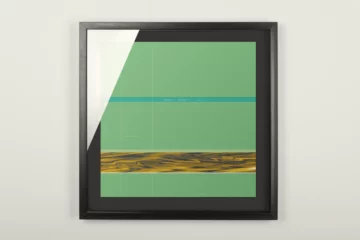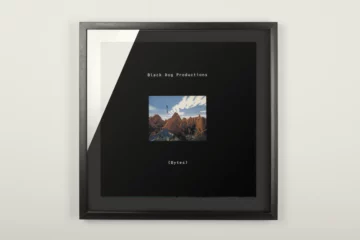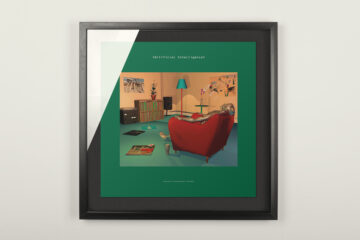»It’s fun, actually,« Daniel Lopatin laughs. »I’ve been doing this for the last 24 hours now and I’m starting understanding my own album,« he says from a comfortable looking chair with a huge glass table littered with sweets, fruits and empty glasses before him. »This« is the usual promo tour most musicians undergo before the release of their new albums. Most of them find that a tiresome task. Not Lopatin however, who obviously enjoys exploring the themes of »Garden Of Delete« (»GOD« for short), his new album under the Oneohtrix Point Never moniker over and over again.
It is nonetheless surprising to hear that someone like Lopatin, whose music has been the subject of as many theoretical debates as it references itself, would not have carefully mapped out a concept for the lucid entity that is »Garden Of Delete«. By announcing the album through a series of mysterious blog posts attributed to an alien called Ezra which refer to the fictional »hypergrunge« outfit Kaoss Edge, Lopatin gave the press and his fans much food for thought, but supplied no real answers. Even more astonishing than that might be how conventionally he goes about promoting his tenth full-length LP, be it with the promotional tour which led him to the back room of the edgy design hotel in which we meet to talk about why he considers himself to be his own cheese shop, Grunge speak and how he aims at taking back the lie.
You have also talked about the sculptural qualities of your music, or that you would like to release your records in the form of sculptures.
That sounds like something I would say. [laughs] Abstract sculptures help me speculate about bodies and spaces that are alien. We all know what a chair is because it is designed and has a purpose. But what do we experience when we look at a “Tony Smith”:https://en.wikipedia.org/wiki/Tony_Smith_(sculptor) sculpture? How can we imagine our bodies in those sculptures that would be totally twisted and contorted or maybe even impossible? That to me is something music should strive for. I’m always trying to make something which feels as exciting as an abstract sculpture.
Then why release records in a conventional physical format like the vinyl LP?
With this record, I wanted to accomplish two things in terms of the listening experience. One was that it was very clear to me that people listen to individual songs in 2015. If you like Taylor Swift, you are only going to listen to your favourite songs or stream related shit on Spotify. So I was imagining my album as related to other music and I was thinking that if it is going to be like that, I hope that there is no chance that someone would stream something on the record which doesn’t feel like it is an entity. At the same time, I wanted to be able to stand back from that experience and look at the whole thing. It is totemic and forms a whole. That urge comes from me growing up loving the 45 minute record, I grew up tripping out to Pink Floyd’s »The Dark Side Of The Moon« about how fucking awesome it was as a movement. I still make records with that movement idea in mind, but I don’t want that to be the only way you can listen to that. I think I achieved that.
That still means there will be a designed product at the end of it. Why not do it like Aphex Twin instead, banging out 80 tracks on Soundcloud?
Because it takes me six months to make eight tracks and I am not interested in showing people my garbage. I feel like a format is relegated to the economic issues we have. It all changes so quickly! Take Philips: When they had just figured out what the CD is and how it was going to work, they calculated that it would take them 15 years to make back the investment – with no guarantee that, 15 years from then, there would even be a CD. 15 years looks luxurious now! We don’t know what streaming will look like in three years. We don’t even know how to monetise streaming to pay artists. So why not put it on Soundloud? I don’t trust Soundcloud. It’s just another cog in this machine that is trying to figure itself out, but could get wiped out tomorrow. But I know what a record is and I don’t feel archaic for believing in it.
But do you really make so much money from record sales?
Depends. I think of myself as a niche business. I have only ever experienced my music related to my audiences on a small business level. The people who like my music support it as best as they can, on the formats that I can provide. I’m not trying to sell a million of copies, so my margin of error is much smaller. I am protected in a way, psychologically speaking. I have my little cheese shop, everybody loves the cheese I sell and they are going to come there no matter what the market does.
At the same time, you wrote the score for the movie »The Bling Ring« and do commissioned works which you released. Is that something you do for financial reasons?
Anytime you do anything which you get paid for, you do it for financial reasons! [laughts] I got bills to pay. I definitely know how to say no to projects and rather gravitate towards things that pose some kind of interesting artistic challenge. Putting out the commissioned stuff on record was really just documenting the work I had done. Certain questions came up though when I was doing »Commissions II«. There were four pieces of the suite »Bullet Hell Abstractions«, but I only put two on the record because two of them served no purpose to be listened to at home. There is some mitigation going on, you can’t just dump everything into a product.
You, like many others, have done work for Red Bull and have participated in the Red Bull Music Academy. There has been an interesting shift in paradigm – twenty years ago, most people wouldn’t have done that in order not to compromise.
That is so archaic! It is already impossible to do anything without some kind of investment by somebody. Do I care if it’s a fizzy water company, a fine arts institution or a record label? Not really. As long as there is not some kind of intervention happening which makes me feel like I have to sell a product, I really don’t have any problem with it. It’s not new either, a lot of composers worked for the church. They had the skills, the church provided them with a way to make music and now we have Bach! Do we sit there now and say: »Sucks that he branded himself?«
The difference is that Bach was a devout Christian.
That’s true, but is being a devout anything the baseline for believing in the art that we listen to? I listen to »Brandenburg Concertos« without any intervention from this idea that he was believing in his mission as a Christian to make the music. Maybe some people do and it’s their whole baseline for having an experience. Some people never read a single word on a work and have no art music context for it, but start crying when they listen to it.
On a larger scale, the criticism being expressed is that corporations become the co-authors of our culture and subcultures even, which a lot of people think is quite problematic.
It can be, definitely. I don’t know if you are fishing for me to say that my music has been propertised by Red Bull, but…
I’m not. It just seems interesting to me, considering your album refers to Grunge. The narrative of Grunge is that of the last Rock revolution…
…but it wasn’t! It was a complete fabrication. Have you ever heard of »Grunge speak«?
No.
There was this secretary at Sub Pop who was tired of journalists coming in, so she gave them all those definitions of cool Grunge words and they published it saying: »Look how all the Grunge kids are talking!« That for me is the perfect metaphor for what Grunge was: a music industry machination that capitalised on a completely disconnected, regionally orientated community of music. They gave it this holistic feeling and sold it back to people. That is why it is so fun for me to play with those ideas. For me it’s like extending the illusionistic nature of all that shit and taking it back.
Take back what exactly?
Take back the lie. Grunge is a historisised thing, all histories are fabricated which are being written by certain individuals. Even language is to me, from a William S. Burroughs perspective, a lie. It’s a virus. His methodology of taking it back was to manipulate the virus, for me it’s just a playful way of entertaining myself with stuff that irritates me.
You are referring to the way you have announced the album sat between advertisement as we know it from Warp – think Boards Of Canada and Aphex Twin – and conceptualism.
You make a record, then wait around for five months, and I always have deep anxiety in those months. I was thinking that I could either let a bunch of people make music videos or entertain myself in a productive way. What I didn’t realise was how much it was actually parodying a viral marketing campaign. That didn’t even occur to me until I realised that it has this weird dynamic of supplanting people’s belief that what they are getting is an organic thing. Then I got even more excited. The confusion where things are coming from and the ambiguation of authorship has been really interesting.
It’s just like what you have said about Burroughs and how language can be perceived as a virus. You also created a lie.
Exactly, and then it sets into motions these other lies and starts generating new work. Regardless of whether that is good or bad work, it’s interesting. Recently, I posted on Twitter various Soundcloud and YouTube fan-based interpretations of the MIDI files people could find on my website. Magazines, clearly not paying attention what even was stated in the YouTube info, wrote stuff like »Oneohtrix Point Never premiers snippets of his album as MIDI«, as if I’m the person who made these things. Which is funny because I don’t want to be the author of them. There are some which I love, but some of them are really bad! It’s like I’m being punished for my lack of possessiveness – which has created this weird possession thing!
I guess that also tells us a lot about how those mechanisms work. You play a lot on Rock tropes, which are based on the myth of the Rock star, but the whole thing backfired and you became a sort of Rock star yourself.
[laughs] Yeah, that’s kind of funny. I’ve never thought of that. I definitely don’t feel like a Rock star at all, not even close to that. The things that I have set into motion ended up having these weird mutations. It’s not the first time I’ve done this and you would think that I would remember to be a bit more curatorial in my search to entertain myself, but I just can’t help it. I guess it’s just boredom.

